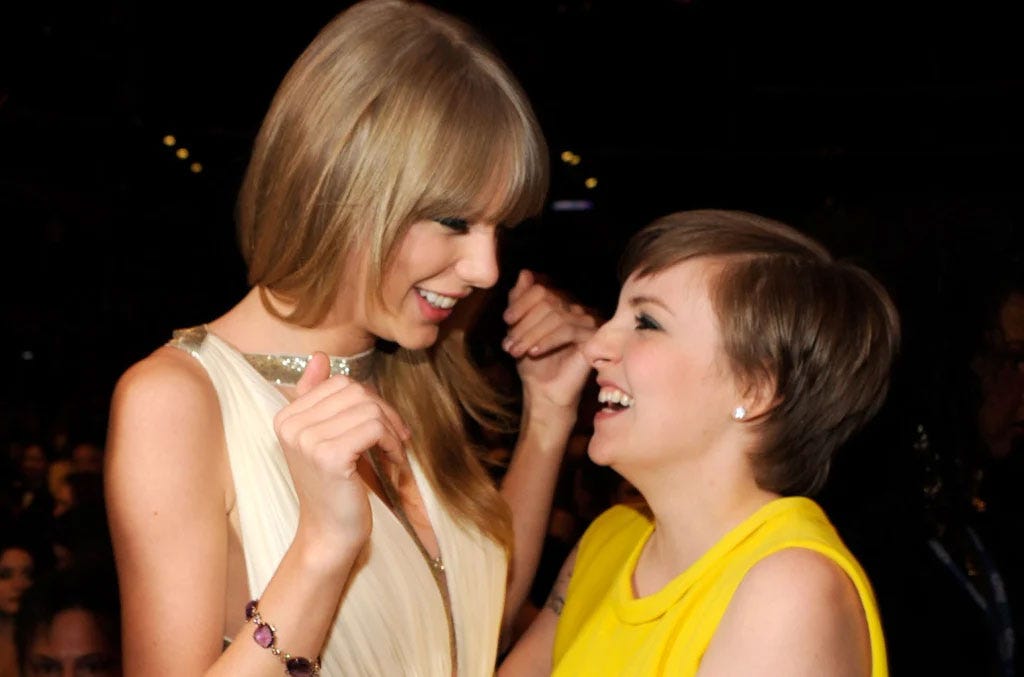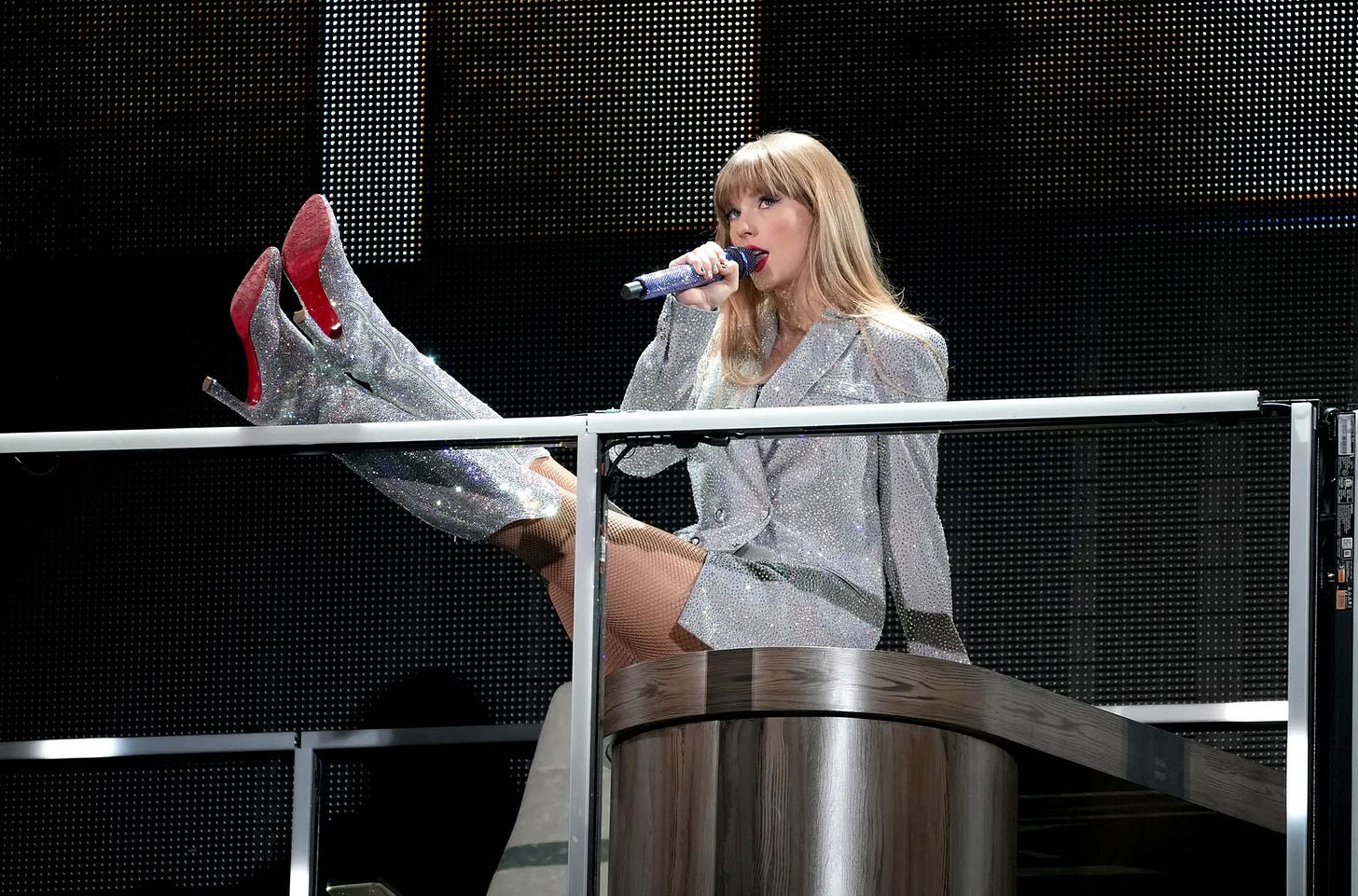Taylor Swift: Man, Media, and the Evolution of a Fearless Feminist
A look at Taylor Swift’s journey from country sweetheart to feminist pop icon
Feeling like “The Man.”
Throughout the years, Taylor Swift has transformed from a country sweetheart into an influential pop icon. An important aspect of this evolution is the progression and maturity in themes she explores through her music 🎵, particularly in the area of feminism. Taylor’s journey from her missteps with earlier tracks like “Better Than Revenge” to the empowering 💪 anthems on her 10th studio album, Midnights, is a testament to her growth as an artist and a feminist.
The Early Days: Internalized Misogyny
In Taylor’s early career, some of her songs seemed to be influenced by the internalized misogyny prevalent in the late 2000s. “Better Than Revenge” from her Speak Now album was often criticized for its lyrics, which were seen as an angry post-breakup revenge song that engaged in slut-shaming. The song, though partly a rebuttal to a Jonas Brothers song that addressed Taylor and Joe Jonas’s breakup, also spent a significant amount of time criticizing his new girlfriend. This was reflective of the culture at that time, which often celebrated pitting women against each other for male appeasement and validation.
Another example is “You Belong With Me”, which, despite being a hit, had Mother putting down another woman for the attention of a man. The music video emphasized the “good girl” vs. “bad girl” dynamic, mocking the other woman for choices like being a cheerleader and wearing short skirts.
During her early career, Taylor was known for her fairytale lyrics, evident in her 2008 hit "Love Story." In the song, Taylor romanticizes her relationship, casting herself as a princess 👸 and her lover as a prince 🤴. This is highlighted by the lines “You be the prince, and I’ll be the princess,” and amplified further by the accompanying music video where she is literally depicted waiting in an ivory tower for her prince. Amanda Hess of Washington City Paper, while defending Taylor’s feminist integrity, pointed out the song’s trope-heavy theme: “Taylor Swift sings songs about waiting around, being a princess, and crying for her ‘Romeo’ to rescue her from her dad, who is so mean. Then, she makes videos for these songs where she is literally waiting in an ivory tower for her prince to come.”
In 2012, in an interview with The Daily Beast, Taylor seemed to distance herself from the label of ‘feminist,’ “I don’t really think about things as guys versus girls. I never have. I was raised by parents who brought me up to think if you work as hard as guys, you can go far in life.” It was a statement that was widely seen as a misunderstanding of feminism’s core principles.
Despite this, Taylor’s career trajectory can be viewed as a testament to her evolving feminist perspective. Even as she was churning out the princess-centered hits, she was creating her own narrative of success, crafting chart-topping songs, embarking on world tours, and dominating the music industry. It’s critical to note that while it is significant when famous women openly identify as feminists, it shouldn’t be mandatory or a means of generating headlines. Around the time of her Daily Beast interview, it became trendy to question young female celebrities about their views on feminism, and the responses were often weaponized as fodder for controversy and Taylor has reflected on that.
A pivotal moment in her journey toward feminism was her public admiration for actress and activist Emma Watson, whose articulate explanation of feminism in a United Nations speech inspired her to become more outspoken in her beliefs.
Feminism and Influence: The Emma Watson Moment
In an interview in Paris in 2014, Taylor openly acknowledged the significant impact of Emma Watson’s UN speech on her perspective. She admired Watson’s ability to present feminism in an “intellectual, beautiful, and poignant way,” explaining that if she had heard such an explanation as a young girl, she would have claimed the title of feminist much earlier in life.
Swift's Interpretation of Feminism
Following Watson’s influence, Swift began to discuss her views on feminism, focusing on her belief that dispels the notion that feminism is about female anger or complaint. Instead, Swift stressed that feminism simply stands for the belief that men and women should have equal rights and opportunities.
In 2014, Taylor began to publicly declare herself a feminist in the US, stating she was influenced by her friend Lena Dunham. This marked the beginning of her feminist education, joining the ranks of other young female stars like Beyoncé, Lorde, Emma Watson, and Chloe Grace Moretz. While Taylor’s acceptance of the feminist label was significant, it is her stumbles since then, amplified by her skyrocketing fame, that have been most illuminating.
Learning through Stumbles - Intersectionality and the VMA Incident
One notable stumble was the 2015 MTV Video Music Awards (VMAs) nominations controversy with Nicki Minaj. Taylor’s “Bad Blood” received a nomination, while Minaj’s “Anaconda” was seemingly overlooked. In response, Minaj tweeted: “If your video celebrates women with very slim bodies, you will be nominated for vid of the year.” Taylor responded, mistakenly interpreting Minaj’s critique as a personal attack and urging Minaj not to “pit women against each other.” Interestingly, “Bad Blood” is thought to be written about Taylor's Bad Blood (now forgiven) with Katy Perry.
Taylor’s initial response revealed a common misunderstanding of intersectional feminism, a concept coined by Kimberlé Crenshaw highlighting that different forms of oppression - like sexism and racism - often intersect and cannot be separately analyzed. In Minaj’s case, her criticism wasn’t about Taylor individually but about the music industry’s systemic bias towards slim bodies and white artists. Taylor, recognizing her error, publicly apologized to Minaj, tweeting: “I thought I was being called out. I missed the point, I misunderstood, then misspoke. I’m sorry, Nicki.” Minaj graciously accepted Taylor’s apology, commending her for her humility and willingness to learn, which marked an important moment in Taylor’s feminist evolution.
The entire incident exemplified the importance of listening, understanding, apologizing, and most importantly, learning from one’s mistakes. Taylor’s experiences provide a roadmap for those navigating the complex, nuanced terrain of feminism, reminding us that it's okay to stumble, so long as we continue to learn, evolve, and strive for equality.
Overcoming Internalized Misogyny and Awakening
Overcoming internalized misogyny is a messy and complicated task, but Taylor began to do just that as her career progressed. As Taylor matured and became more aware, she started using her music as a platform for empowerment and gender equality. Albums like 1989, Reputation, and Lover began to show a shift in Taylor's feminist consciousness.
One notable song is “The Man” from Lover, where Taylor critically examines the double standards that women face compared to men, particularly in the music industry. Lines like, “I'm so sick of running as fast as I can, wondering if I’d get there quicker if I was a man” and “They wouldn't shake their heads and question how much of this I deserve” showcase her frustration with gender inequalities and binary and heteronormative expectations and privileges.
Woman of the Decade
In 2021, Netflix's “Ginny & Georgia” included a sexist joke targeting Taylor's past relationships. Taylor called out the “lazy, deeply sexist joke” on Twitter, asserting that such humor is outdated and harmful.
Taylor’s journey, however, is more than just about dealing with criticism. Her Billboard Woman of the Decade Award acceptance speech gave a powerful glimpse into her experiences as a female artist. She questioned why women in the music industry must work exceedingly hard to prove their worth and are often held to impossibly high standards. This introspection provides an insight into the challenges she, and many other female artists, face.
Midnights: A Feminist Powerhouse
By the time Taylor released her 10th studio album, Midnights, it was evident that her lyrical genius had been honed to address a variety of topics, including feminism. With empowering lyrics such as “He wanted a bride, I was making my own name” in “Midnight Rain” and “Ladies always rise above” in “Vigilante Sh*t,” Taylor embodies the spirit of modern feminism. This album is filled with anthems that encourage womxn to reclaim their power, embrace independence, and challenge societal norms.
Reflecting on the Past and Moving Forward
Taylor’s evolution as a feminist reflects not just her own growth, but also the cultural shift towards more inclusive and empowering narratives for women. As a role model for millions, her journey highlights the importance of reflection, learning, and using one's platform for positive change. From internalized misogyny to feminist anthems, Taylor’s musical journey mirrors the ongoing fight for gender equality, inspiring generations to rise above and make the world a better place.
The Encore: A Cultural Shift and an Ongoing Symphony
As Taylor continues to make “the whole place shimmer”, with her empowering music, her evolution reflects the cultural shift toward feminism and equality.
She’s not just a star; she’s a catalyst. As society evolves, Taylor’s role in conversations around feminism and activism becomes even more significant. The sentiment of the lyric “give me back my girlhood, it was mine first” from “Would’ve, Could’ve, Should’ve” could be anthemic and representative of the reclaiming of personal narratives that is central to modern feminism.
Tearing Banners Down in the Music Industry
In an industry often characterized by misogyny, Taylor has taken the battle underground, in fighting the patriarchy she attempted to "tear their banners down”. Through her relentless pursuit for artists’ rights, especially for women, she has paved the way for meaningful change.
Her dispute with Big Machine Label Group over her masters highlighted the industry's gender inequalities and inspired many young female artists to stand tall.
The Power of her Platform
The Fender guitar company coined the term “Taylor Effect,” when a study from 2018 concluded that fifty percent of new guitar owners were women inspired by Taylor to pick up the ax. Publications widely acknowledge Taylor Swift as a modern cultural phenomenon. Bloomberg Businessweek even went so far as to dub her “The Music Industry” in a cover story in recognition of her immense influence. Taylor possesses a unique blend of chart success, critical acclaim, fervent fan support, and controversy that allows her to profoundly influence and elicit responses from not just the music industry, but society at large.
Swift’s commercial success is considered exceptional by industry observers, given her extraordinary accomplishments across diverse areas such as album sales, digital sales, streaming, airplay, vinyl sales, official charts, and touring revenue. Importantly, she has used her platform to raise awareness about sexism and racism, both within and outside the music industry. Her outspoken stance has led to important conversations and has helped drive change within these spheres. Swift has been a staunch advocate for artist rights and has been instrumental in promoting reforms within major entities like Spotify, Apple Music, Ticketmaster, and traditional recording contracts. She has publicly called out corporate greed and spotlighted the importance of protecting masters and intellectual property.
Taylor Swift’s Political Awakening: Amplifying Women’s and Gay Rights
In 2018, Taylor Swift marked a pivotal point in her career by breaking her long-held political silence. For the first time, Swift spoke about politics, endorsing the Tennessee Democratic candidates who were running for U.S. House and Senate, Phil Bredesen and Jim Cooper, through her social media posts.
“In the past I've been reluctant to publicly voice my political opinions. I feel very differently about that now. I believe in the fight for LGBTQ rights, and that any form of discrimination based on sexual orientation or gender is WRONG. I believe that the systemic racism we still see in this country towards people of color is terrifying, sickening, and prevalent.”
This critical stance against discrimination and her commitment to fight for LGBTQ rights underscores her commitment to feminist values and her evolution as an advocate for equal rights.
Swift later disclosed that early in her career, executives at Big Machine and other labels had advised her to refrain from discussing politics, citing the Dixie Chicks controversy as a cautionary tale. However, the political climate under Trump’s presidency drove her to reassess this position. She voiced regret for not endorsing Hillary Clinton in the 2016 election and expressed her concern about how the criticisms targeted at her following the West-Kardashian feud in 2016 echoed those against Clinton, and she questioned whether her endorsement would have been a liability.
Swift’s newfound political outspokenness didn’t end there. She went on to describe Republican Senator Marsha Blackburn as “Trump in a wig,” criticizing her for embodying a dated, harmful stereotype of what society expects women to be.
Change
Taylor’s political activism peaked through in Netflix’s Miss Americana, a documentary that shed light on her decision to be more vocal on issues. It meant tearing down the walls that held her back, just like the ones in her song “Change,” a very early indicator of a revolution she was still defining when she wrote it in 2007.
You Need To Calm Down
Taylor’s activism goes into her actual songs. Her voice has become a force to be reckoned with as she advocates for issues close to her heart, such as LGBTQ+ rights and gender equality. As Taylor continues her journey, her feminist awakening has also opened doors for discussions surrounding womxn, queerness and gay rights. While Taylor has been known to celebrate and support the LGBTQ+ community, especially with her anthem “You Need To Calm Down”, it’s also essential to understand the nuances and concerns of queer fans. Taylor, through her music and philanthropy, is in a unique position to shape the dialogue around these issues. “You Need To Calm Down” has been an inspiration to the LGBTQ+ community, but it’s essential that Taylor and her fans engage with the concerns raised by theorists like Judith Butler, who problematizes named queerness and strictly defined queer identities. Many queer fans of Taylor and the broader LGBTQ+ community have expressed their discontent with the metaphor of the closet. They question whether being “out” is truly liberating, or if it's still a form of subjection. Taylor, with her colossal influence, could be instrumental in reshaping this narrative.
Butler warns that there’s a danger in linking queerness and the closet so fundamentally. We end up defining ourselves in terms of the tools of heteronormative oppression, which gives those tools power. In her 2009 essay, “Imitation and Gender Insubordination,” Butler presents an opportunity for Taylor to realize that the labels of gay and straight are not in opposition but instead co-evolved. Taylor could leverage her platform to foster conversations that encourage an understanding of the fluidity and multiplicity of queer identities. By engaging with the queer community in more nuanced ways, she could help deconstruct the metaphor of the closet and pave the way for richer discussions.
Like the starlit ✨warrior she is, Taylor Swift’s journey from a young country singer to a feminist icon “fighting dragons” has been monumental. With a message of empowerment, she has shown that when you “dress for revenge,” you adorn yourself with the armor of resilience, empowerment, and openness to change. Self-examination, reflection and rebirth are themes, not just associated with her romantic exposition, but her vision and brand as well.
Want more?
Join us at rmrk*st all month for Taylor Swift content! Make sure you check out the listening parties, watch parties and more we have planned at Remarkist on our app! And if you love games, check out our Instagram for Melodic Mayhem, our bracket-style lyric showdown! You can find and chat with other Taylor Swift fans on our Discord!











